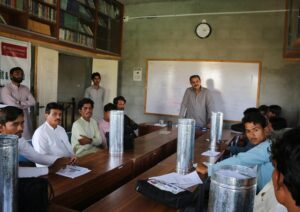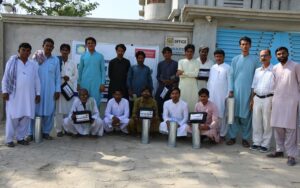Climate change monitoring thru youth and lightening arrestors installed in Thar villages

Climate change monitoring thru youth and lightening arrestors installed in Thar villages
Chachro (May 3, 2024) First ever in Tharparkar, climate change monitoring through local youth and lightening arrestors installation is done in ten villages of Chachro taluak of district Tharparkar by Association for Water, Applied Education and Renewable Energy (AWARE) under a terre des hommes-TDH funded project.
In an event organized here, Engineer Kashan Faiz said that the climate change monitoring in regions like Tharparkar, a desert region in Pakistan, was crucial due to its vulnerability to the impacts of climate change. First ever in history of Thar, AWARE introduced climate change monitoring; temperature, humidity, rainfall, water quality and wind patterns by youth and installed lightening arrestors in 10 villages of Chachro, Tharparkar. By actively participating in climate change monitoring and taking meaningful actions, youth in Tharparkar can play a significant role in building resilience and mitigating the impacts of climate change in their region, he added.
Ali Akbar Rahimoo expressed by quoting some studies pointed out that Tharparkar is more vulnerable of climate change effects as compared to other part of Pakistan and must be monitored at community level. He added that the global average temperature has increased by about 0.6°C and situation of Pakistan is alarming, annual mean temperature has risen for the country as a whole by 0.74°C over the last five decades while The mean temperature of Lower Sindh is raised by 0.08 °C. However, according previous study, temperature of Thar region is changing drastically due climate change and average temperature goes up 1.15 °C between 2021 to 2030 and this an alarming situation for Tharparkar.

By expressing his views, Dr. Rahib Ali said that involving local communities in scientific data collection and monitoring efforts to gather traditional knowledge and enhance local capacity is an innovative approach and first ever such initiative is taken in history of Tharparkar. Water availability, and quality to understand the impact on agriculture and drinking water sources. Monitoring crop growth patterns and yields to assess the impact of changing climate on agriculture. Youth will raise awareness about climate change and its impacts through workshops, seminars, and educational campaigns in schools and communities as well as advocate for policies that address climate change adaptation and mitigation at local, regional, and national levels, he added.
A youth group representative, Suresh Kumar shared that youth must be aware about climate effects and future risks, I think, this a revolutionary step that taken by AWARE to train youth monitor climate change pattern by collecting accurate data and utilized for further planning to reduce risk of climate effect in Thar region.
Ghulam Rasool shared that in past, youth had been engaged in community-led initiatives such as tree planting, water conservation projects, and sustainable agriculture practices but this is new role us. The need of hour is to harness innovation and technology to develop solutions for climate change adaptation, such as renewable energy technologies and water-efficient farming techniques. Building networks and partnerships with other youth groups, NGOs, and government agencies to amplify their voices and leverage resources for climate action, he added.
On the occasion, there were 10

climate change monitoring kits were provided to youth groups representatives for collecting data through scientific apparatuses including anemometer, pH meter, TDS meter, temperature meters, humidity meter and rain gauge. For security from lighting strikes, AWARE first time installed lighting arrestor rods in ten villages of tehsil Chachro, Tharparkar including Ahmed Jo Tar, Habib Samejo, Satla, Daki Dahar, Jassar, Bhadasandha, Charihar, Arnaro Tobhario, Garario and Bahar Bheel.
According the government data, only in 2023 due to sky lightning strikes and rains have lost 3 people and injured 6 in tehsil Chachro and Nagharparkar while total 326 animals perished due to the lightning strike including one cow, goats 222, sheep 91, camels 7 and buffalo 2, donkey 3 and 2 houses were burnt reported. In, 2024, since January to April, several lighting strikes occurred due to the unpredictable rains. Just on April 7 due to rain 24 incidents were reported and in village Herar Kolih 7 cow died due to a sky lightning strike.





